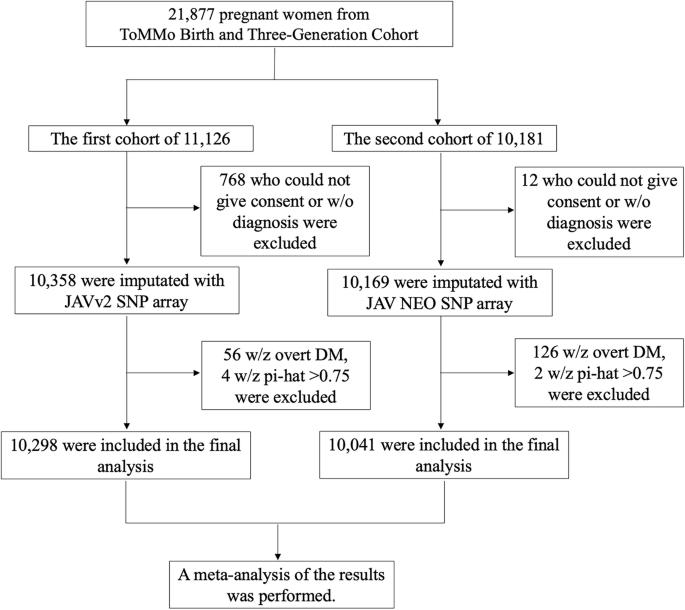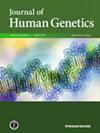Genetic effects on gestational diabetes mellitus and their interactions with environmental factors among Japanese women
IF 2.5
3区 生物学
Q2 GENETICS & HEREDITY
引用次数: 0
Abstract
Gestational diabetes mellitus (GDM) is common in Japanese women, posing serious risks to mothers and offspring. This study investigated the influence of maternal genotypes on the risk of GDM and examined how these genotypes modify the effects of psychological and dietary factors during pregnancy. We analyzed data from 20,399 women in the Tohoku Medical Megabank Project Birth and Three-Generation Cohort. Utilizing two customized SNP arrays for the Japanese population (Affymetrix Axiom Japonica Array v2 and NEO), we performed a meta-analysis to combine the datasets. Gene-environment interactions were assessed by modeling interaction terms between genome-wide significant single nucleotide polymorphisms (SNPs) and psychological and dietary factors. Our analysis identified two SNP variants, rs7643571 (p = 9.14 × 10−9) and rs140353742 (p = 1.24 × 10−8), located in an intron of the MDFIC2 gene, as being associated with an increased risk of GDM. Additionally, although there were suggestive patterns for interactions between these SNPs and both dietary factors (e.g., carbohydrate and fruit intake) and psychological distress, none of the interaction terms remained significant after Bonferroni correction (p < 0.05/8). While nominal significance was observed in some models (e.g., psychological distress, p = 0.04), the data did not provide robust evidence of effect modification on GDM risk once adjusted for multiple comparisons. These findings reveal novel genetic associations with GDM in Japanese women and highlight the importance of gene-environment interactions in its etiology. Given that previous genome-wide association studies (GWAS) on GDM have primarily focused on Western populations, our study provides new insights by examining an Asian population using a population-specific array.

日本妇女妊娠糖尿病的遗传效应及其与环境因素的相互作用。
妊娠糖尿病(GDM)在日本妇女中很常见,给母亲和后代带来了严重的风险。本研究调查了母体基因型对 GDM 风险的影响,并研究了这些基因型如何改变孕期心理和饮食因素的影响。我们分析了东北医学大型数据库项目出生和三代队列中 20,399 名妇女的数据。利用两个为日本人群定制的 SNP 阵列(Affymetrix Axiom Japonica Array v2 和 NEO),我们进行了荟萃分析以合并数据集。通过对全基因组重要的单核苷酸多态性(SNPs)与心理和饮食因素之间的交互项进行建模,评估了基因与环境之间的交互作用。我们的分析发现,位于 MDFIC2 基因内含子上的两个 SNP 变异 rs7643571(p = 9.14 × 10-9)和 rs140353742(p = 1.24 × 10-8)与 GDM 风险增加有关。此外,虽然这些 SNPs 与饮食因素(如碳水化合物和水果摄入量)和心理困扰之间的交互作用有提示性模式,但经 Bonferroni 校正后,这些交互作用项均不显著(p = 1.24 × 10-8)。
本文章由计算机程序翻译,如有差异,请以英文原文为准。
求助全文
约1分钟内获得全文
求助全文
来源期刊

Journal of Human Genetics
生物-遗传学
CiteScore
7.20
自引率
0.00%
发文量
101
审稿时长
4-8 weeks
期刊介绍:
The Journal of Human Genetics is an international journal publishing articles on human genetics, including medical genetics and human genome analysis. It covers all aspects of human genetics, including molecular genetics, clinical genetics, behavioral genetics, immunogenetics, pharmacogenomics, population genetics, functional genomics, epigenetics, genetic counseling and gene therapy.
Articles on the following areas are especially welcome: genetic factors of monogenic and complex disorders, genome-wide association studies, genetic epidemiology, cancer genetics, personal genomics, genotype-phenotype relationships and genome diversity.
 求助内容:
求助内容: 应助结果提醒方式:
应助结果提醒方式:


